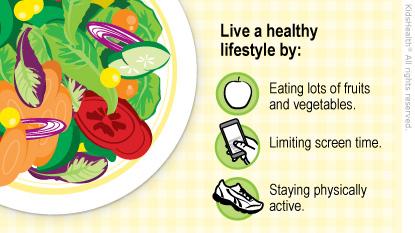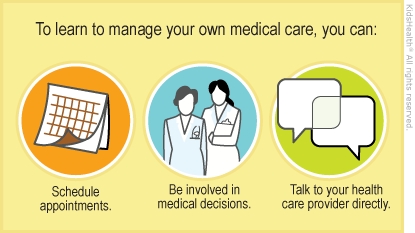Your 19-Year Visit
At your yearly visit, your health care provider makes sure you are healthy and answers any questions you may have.


Make healthy diet choices:
-
Eat a balanced diet that includes lean protein (like chicken and fish), whole grains, fruits and vegetables, and low-fat dairy.
-
Get about 3 dairy servings a day. This can include low-fat or nonfat milk, fortified soy milk, and low-fat cheese and yogurt. Non-dairy sources of calcium include fortified juice, cereal, and bread; dark leafy greens; and tofu (calcium-set).
-
Eat iron-rich foods every day. Meat, poultry, seafood, beans, and iron-fortified items (such as bread and cereals) are all good sources of iron.
-
If you drink juice, limit it to 8 ounces (240 ml) a day of 100% juice. Even though the sugar in juice is "natural," it still can lead to unwanted weight gain and isn't good for your teeth.
-
Read food labels and limit foods that are high in fat (such as red meat), added sugar (such as soda and sports drinks), and salt (such as fast food).
-
Skip energy drinks. They can contain lots of caffeine or other caffeine-like stimulants and may cause health problems.
Make healthy lifestyle choices:
-
Keep a healthy weight.
-
Get at least 150 minutes of moderate physical activity (like fast walking) or 75 minutes of vigorous activity (like running) a week.
-
Balance screen time with other healthy behaviors.
-
Get 7–9 hours of sleep every night.
-
Avoid smoking (including e-cigarettes and hookahs), drug use (including prescription, nonprescription, and inhalants), and drinking alcohol.
Make good choices about sex and relationships:
-
If you are sexually active, always use a condom to protect yourself and your partner from STDs (sexually transmitted diseases) and unwanted pregnancy.
-
Do not stay in a relationship that is violent or disrespectful, or where you feel pressured for sex.
-
If you need help, you can:
-
Talk to your health care provider.
-
Call the National Domestic Violence Hotline at 1-800-799-7233 or go to www.thehotline.org.
-
Call the loveisrespect helpline at 1-866-331-9474 or go to www.loveisrespect.org.

-
Make and follow through on future college, military, or work plans.
-
Continue to spend time with family.
-
Understand and fulfill your own spiritual needs.
-
Keep friends who enjoy doing fun and safe things together.
-
Look for social, community, and sport activities that you enjoy.
-
Be thoughtful about how your texts or social media posts might hurt others.
-
Find ways to handle stress, such as talking about feelings, exercising, and enjoying relaxing activities (like listening to music or hanging out with friends). It is always OK to ask for help.
-
Talk to your health care provider if you:
-
feel sad or hopeless a lot of the time
-
aren't enjoying the things you used to enjoy
-
ever have thoughts of hurting yourself
-
Use talking (instead of violence) as a way to work through disagreements with others.

-
Be safe in the car:
-
Always wear a seatbelt.
-
Never drink/use drugs and drive or get in the car with someone who has been drinking/using drugs. Call someone you trust if you need help.
-
Obey the speed limit and drive responsibly.
-
Do not text or use a cell phone while driving.
-
Protect your hearing:
-
Be safe on the Internet. Don't give out personal information or post anything that you wouldn't want shared.
-
Never take prescription medicines that were not prescribed for you by a health care provider.
-
If you play sports, use proper sports safety equipment including helmets, mouth guards and eye guards, and padding.
-
Do not carry or use weapons.
-
Avoid tanning beds. They increase the risk of skin cancer.
-
If you're worried that you have a drug or alcohol problem, talk to your health care provider about ways to get help. Signs of drug and alcohol addiction include:
-
a strong need for the substance
-
needing more of the substance to get the same effect as before
-
having problems when the substance is not used, such as shaking, diarrhea, and feeling sick
-
mood swings, no longer spending time with family and friends, falling grades, changes in sleeping patterns, and weight loss or gain


-
Manage your own medical care:
-
Start to think about where you will go for your regular medical care after age 21. Your current health care provider can help you find a new doctor.
-
Arrange health insurance. Most insurance plans allow you to stay on your parents' plan until age 26. You can also get insurance through your school and/or work. If you need help finding health insurance, go to https://www.usa.gov/finding-health-insurance.
-
Know where to go for medical care (including birth control and mental health help).
-
Schedule routine medical care (including with a gynecologist for young women) and dental visits.
-
Make and keep a medical plan for any ongoing illnesses, such as asthma or ADHD.
-
Understand and follow your health care provider's instructions on immunizations and medical testing.
-
If you live away from home:
-
Brush your teeth twice a day with fluoride toothpaste and floss once a day. Go to the dentist every 6 months.
-
In the sun, use a water-resistant sunscreen with an SPF of at least 30, and re-apply every 2 hours or more often if swimming or sweating.
-
Your health care provider can tell you about help that is available in the community or through a social worker. Talk to your health care provider if you're worried that you:
-
don't have enough food
-
don't have a safe place to live
-
don't have health insurance
-
have a problem with drugs or alcohol